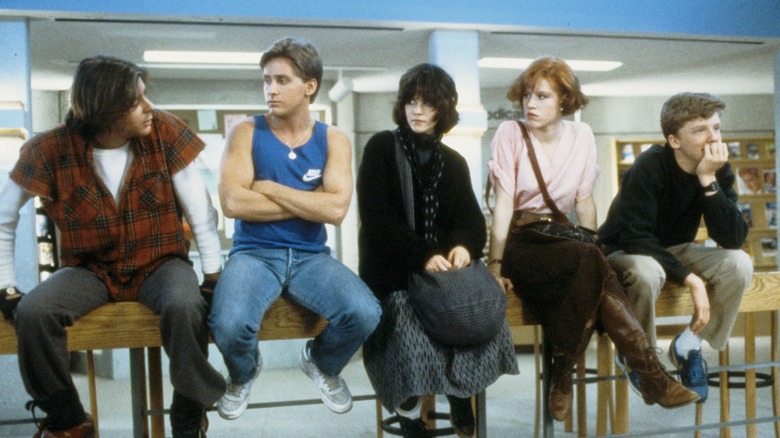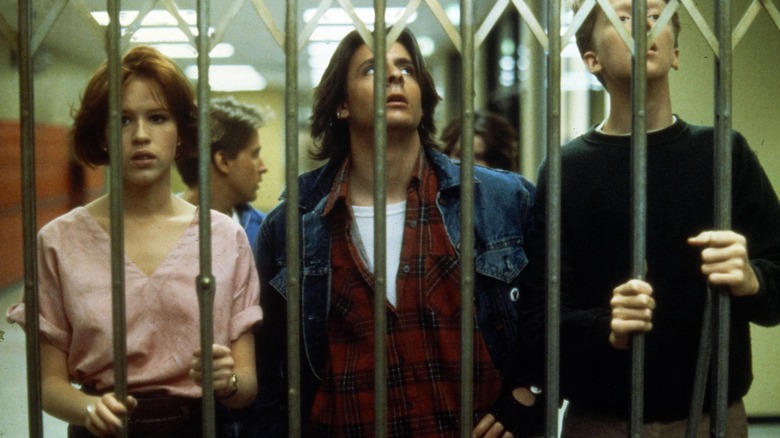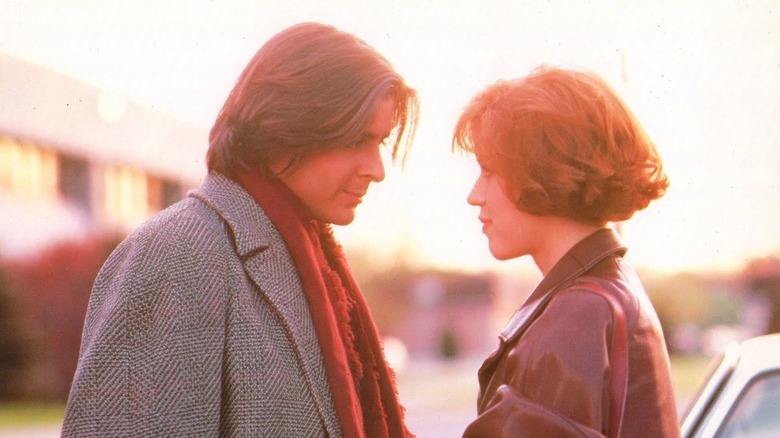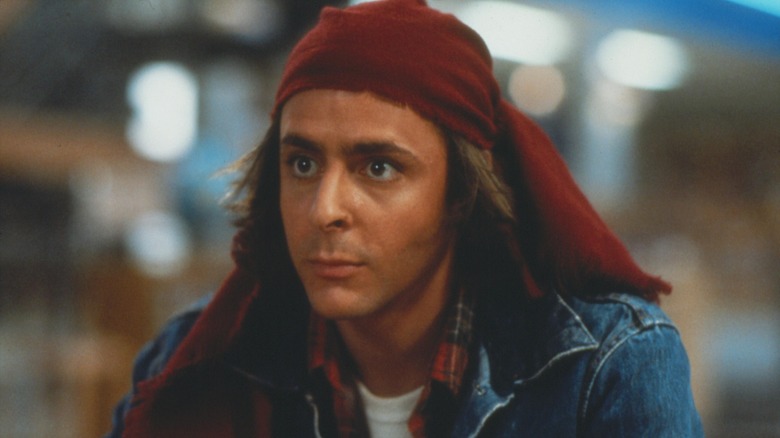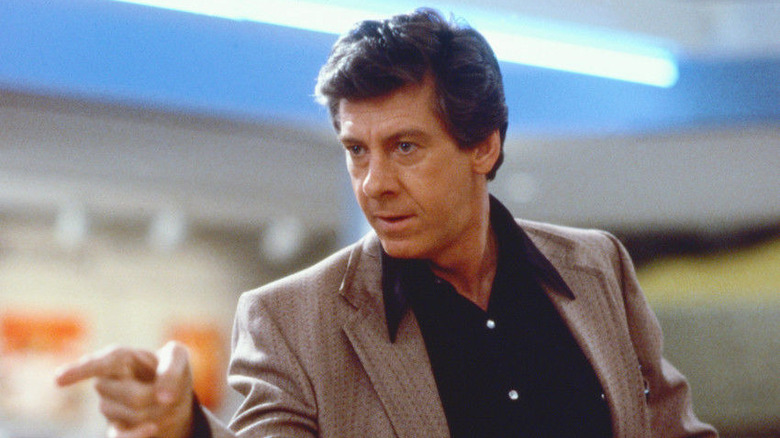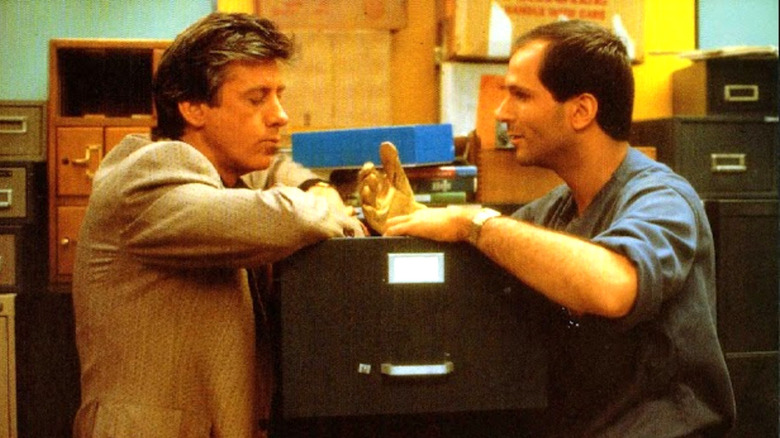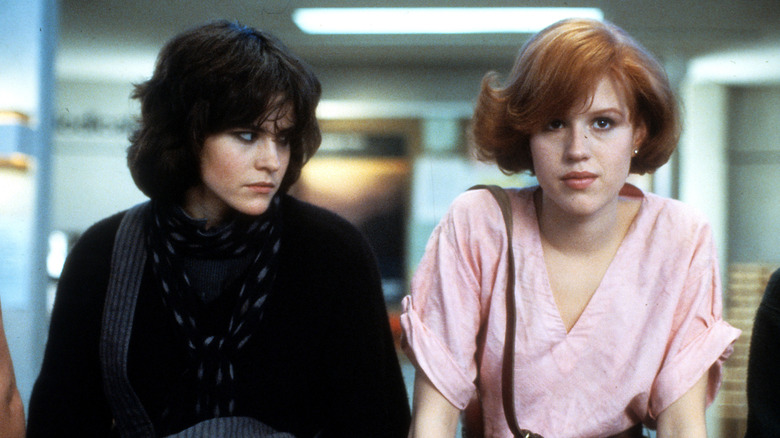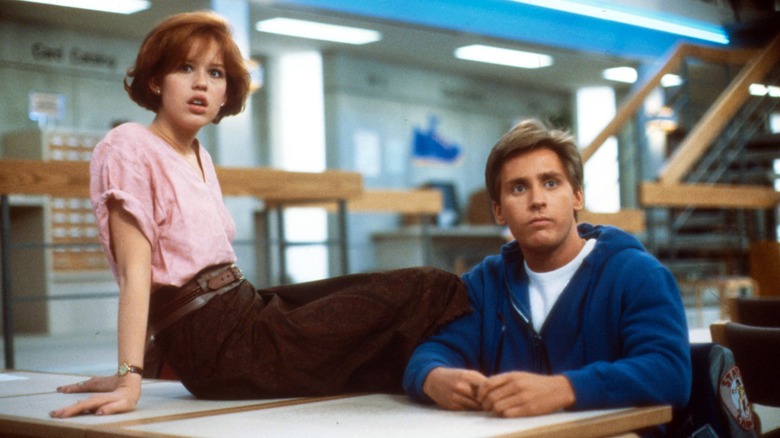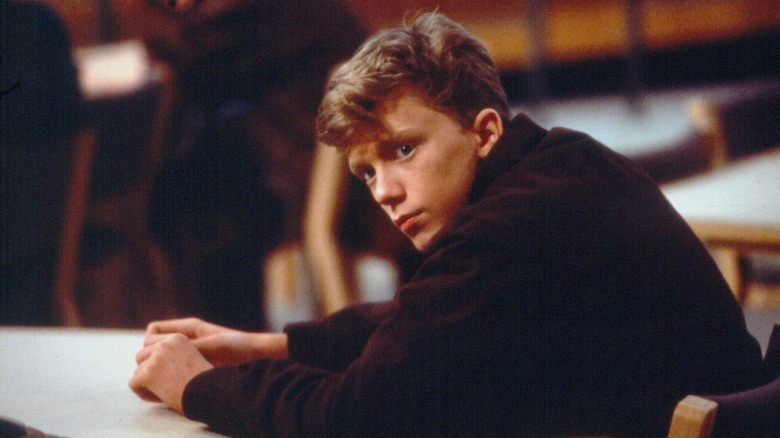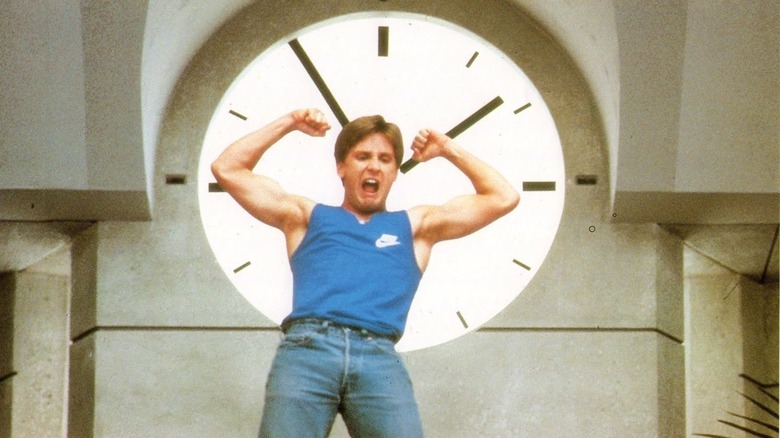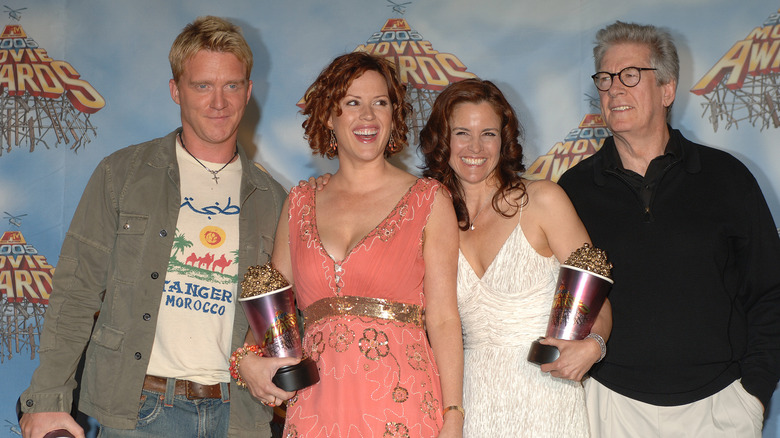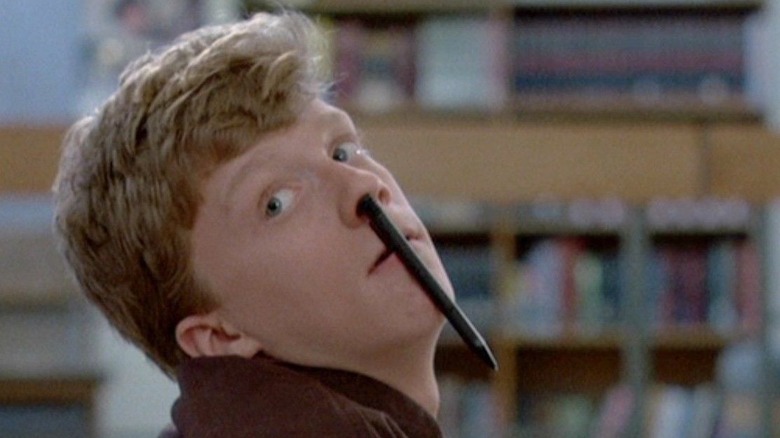The Ending Of The Breakfast Club Explained
If there's one thing they knew how to do well in the 1980s, it was to make coming-of-age movies that the teenage market found hard to resist — and director John Hughes reliably hit the bullseye time after time. Released in 1985, "The Breakfast Club" doesn't have motorbike riding, rock n' roll loving vampires like "The Lost Boys," or a time-traveling teen everyman like "Back to the Future." It doesn't have the masterful plot of "The Goonies" or the gravitas of "Stand by Me" or "The Outsiders," but what it does have is uncompromising realism and a motley crew of characters that almost every teen on the planet could relate to.
"The Breakfast Club" is a simple tale of five seemingly different teenagers who spend a day in detention together and gradually realize they're not so different from one another after all. Hughes' genius is to take teenage archetypes such as the rebel without a pause, the awkward misfit, the nice guy nerd, the wholesome jock, and the high school sweetheart, and give them unique voices and personalities. He then forces them to interact and acknowledge what really differentiates and defines them. Let's set the table and tuck into all the dazzling delights the ending of "The Breakfast Club" has to offer.
What you need to remember about the plot of The Breakfast Club
"The Breakfast Club" is a day in the life of five Chicago teens who attend Shermer High School. Andrew Clark (Emilio Estevez), John Bender (Judd Nelson), Claire Standish (Molly Ringwald), Brian Johnson (Anthony Michael Hall), and Allison Reynolds (Ally Sheedy) all find themselves in detention under the watchful eye of authoritarian bully and teacher Richard Vernon (Paul Gleason). In theory, because of their disparate high-school social circles, they could all give each other the cold shoulder and sit in awkward and indifferent silence until the end credits ... but that wouldn't be a very compelling movie.
After Bender does a little prodding, poking, and probing to get under the skin of his fellow detainees, sparks begin to fly. Pretty soon everyone's asking themselves and one another some pretty difficult questions about their place and purpose in life. Ironically, at the beginning of detention, their teacher sets them the task of writing an essay about who they think they are as individuals. The five teens all draw an interesting conclusion — not through solitary contemplation, but through interaction, arguing, emotional confessions, and acknowledging hard truths. Instead of losing touch with their true selves to a constricting and increasingly narrow range of expectations, they throw off the shackles of conformity and celebrate the unlimited power and potential of youth to plow new paths and aim for brighter horizons.
What happened at the end of The Breakfast Club
Following a period of fighting, bullying, abusing, criticizing, demeaning, and undermining one another, the gang of Generation X delinquents forges a common bond through adversity and smoking a little pot. It dawns on them that most of their hang-ups have been manufactured by the status-driven and materialistic wasteland their baby boomer teachers and parents helped create. However, despite the group forming their connection in the closed environment of the detention room, Claire is honest enough to admit that when school starts on Monday, they'll probably still all ignore one another because the power of social conformity is too unrelenting.
This sparks anger amongst the others, but as a consolation, their shared experience has irrevocably changed the way they perceive themselves and others. Before their time is over, Claire gives Allison a makeover which awakens a romantic curiosity in Andrew. Claire makes out with Bender, who pretty much savages her with insults throughout the entire movie. She also gives him one of her diamond earrings as a keepsake which he dutifully puts in his ear. In the end, the five go their separate ways while Brian's voiceover reads from his essay. In defiance of Vernon's judgment of them all, he states that what they've learned is, "Each one of us is a brain, an athlete, a basket case, a princess, and a criminal. Does that answer your question?"
Why John Bender is integral to The Breakfast Club
A lot of the tension in "The Breakfast Club" comes from Bender's self-destructive habit of continually locking horns with Vernon. The teacher represents the unreasonable and tyrannical power of the adult world. Bender's heroic and unwavering determination to stand fast in the face of such an individual is inspiring to the audience and the other members of "The Breakfast Club." Bender is the spark that ignites that fire and the personification of youthful rebellion. Richard Vernon loathes him because Bender reminds him of the lost ideals, dreams, and refusal to lay down and die the baby boomers were once renowned for.
Bender is a walking mess of behavioral issues that were created solely by the authoritarian adults in his life. The rest of "The Breakfast Club" also appear to initially loathe Bender. They continually say things like no one likes him, nor would they miss him if he didn't exist. In this sense, he is a representative of the primal forces in all young people urging them to rebel and it makes his more conformist peers and authoritarian adults uncomfortable as hell. That's why they lash out and why Bender, more than any other character, is integral to the plot of "The Breakfast Club." It makes perfect sense that the final frame of the film is a freeze-frame of him triumphantly pumping his fist in the air as if to say, "mission complete."
Why the threat of violence changes everything
At first, Bender's confrontations with Vernon have a humorous, almost slapstick quality, particularly the scene where Bender keeps making snarky quips until he's on the receiving end of another eight weeks' worth of detention. Yet, later on in the movie when the teacher finally snaps and locks Bender in a storage closet, things take on far more of a grimmer aspect. After being mocked mercilessly by Bender in front of the other teens, Vernon takes advantage of the lack of an audience to show his true colors. He threatens that if he sees Bender on the street after he's left school, he'll beat the living crap out of him. A shocked Bender suddenly loses all his cool and street smarts and it's heartbreaking to see the lost little boy beneath the brash exterior.
Bender exclaims, "You threatening me?" To which Vernon replies, "What are you going to do about it? Do you think anyone's going to take your word over mine? I'm a man of respect around here." He then removes his jacket and snarls, "On your feet pal, let's see how tough you are." He then mockingly pleads, "Take a shot. Just one swing." When a shellshocked Bender refuses, he calls him "a gutless turd" before walking away. It's a genuinely unsettling moment and sets the tone for the rest of the film.
What does Carl the janitor signify?
Carl the janitor (John Kapelos) is an interesting character. He appears to represent what happens in the world when you become an adult and refuse to play the game. Asked what he wanted to be when he grew up, he says, "John Lennon." Carl is a baby boomer who stayed true to who he is and refused to sell out his principles. Although many people in a status-driven and materialistic society — including members of the Breakfast Club — look down on the role of the janitor, Carl is seemingly happy enough with his lot. As someone on the outside looking in, he has a unique perspective. As he tells Bender, "I am the eyes and ears of this institution, my friends."
Carl acts as a wiser and more understanding counterbalance to the judgmental and scornful attitude of Vernon. When Vernon says in his 22 years of teaching, the only certain thing is the kids get more and more arrogant, Carl calls bull and replies, "C'mon Vern, the kids haven't changed, you have." He then adds, "If you were 16, what would you think of you?" The scene poignantly sums up how each generation is subsequently absorbed and nullified by the system. As Allison says later in the film, "It just happens. When you grow up your heart dies." The sneaking admiration Bender has for Carl also suggests that this could also be his future.
Why Allison's transformation is so problematic
One of the key takeaways from "The Breakfast Club "is to be yourself and stop living up to people's other expectations of you, which makes Allison's makeover towards the end an issue on a few different levels. Her initial look is original, cool, and oddly timeless — she scans as a Siouxsie and the Banshees and Bauhaus fan, but her thrift store goth sensibilities also fit with grunge and emo subcultures from the upcoming decades. Yet, it's only when she's turned into a clone of an ideal '80s beauty — when Claire dresses her up to make her look more like Claire, basically — that she appears to be accepted by her peers and seen as potential girlfriend material by Andrew. It completely undermines the message of the film.
Allison is a very strong character with a defining look. It's patronizing to suggest that she needs the help of a rich and popular girl like Claire to show her the possibility of all she could be. As she appears in a pink top with her hair pulled back and a face full of makeup, the cheesy music plays, and the scene is a bummer note in a film with very few. Ally Sheedy revealed to The Independent in 2020 that she fought Hughes over the controversial makeover scene but conceded, "Listen, it was Hollywood in the '80s. They wanted to take the ugly duckling and make her into a swan. I didn't want anyone to be putting makeup on my face, so I tried to negotiate with John that it would be about taking stuff off, or Allison taking down this wall she had put up to keep people at arm's length."
What the end of The Breakfast Club means
The ending of "The Breakfast Club" suggests that you can only find happiness and true friends by being yourself, yet there are no fairytale happy endings in the film. When the end credits roll, everything is left pretty unresolved and ambiguous. Bender and Claire and Allison and Andrew pair up romantically, leaving Brian the odd one out. The diamond earring that Claire gives Bender could be a token of her commitment, or it could be seen as a metaphorical bribe to join the status quo he's always rallied against. Allison's makeover also appears to be a capitulation suggesting if you can't beat 'em, join 'em.
The true power of the ending lies in the fact that all five members of the Breakfast Club have finally accepted that, in the words of Andrew, "We're all pretty bizarre, but some of us are better at hiding it; that's all." They have acknowledged that being overtly influenced by the attitudes and behavior of their parents has led them to some pretty ugly places. Yet they have also realized that only by accepting the responsibilities of your actions can you become a mature person. The future for all five characters is uncertain — it's unlikely that they'll stay friends, but for one day at least, they found a measure of happiness and acceptance.
Would Brian be gay in a modern version of The Breakfast Club?
In a film about young people feeling alienated and striving to fit in, it's interesting that there are no ethnic minorities or gay people in "The Breakfast Club." By today's standards, this seems a little strange. The lack of non-white people could be because there were no Black Brat Pack actors, which is its own story. However, the absence of a gay character indicates that perhaps the audience of 1985 wasn't ready for a mainstream film about a teen dealing with their sexuality. Yet, there does seem to be an underlying suggestion that Brian, who is reduced to tears about the pressure he struggles with, could be gay — or, at least a character who symbolically expresses the hidden anxieties many closeted LGBT+ people struggle with.
In the film, Brian is the only member of "The Breakfast Club" who doesn't get a love interest. He's also the character towards the end of the film who appears to be buckling under the most pressure. As it turns out, he is in detention because the school authorities found a gun — albeit a flare gun — in his locker. In tears, he reveals he was considering suicide because his grades were not living up to the fierce and unrelenting expectations of his parents, but his distress could indicate something else is troubling him. It's interesting to note that if "The Breakfast Club" was made now, the filmmakers could easily decide to write Brian as gay. In general, society is much more accepting of LGBT+ folks than it was during the Reagan era.
Who's the real villain of The Breakfast Club?
At face value, Vernon's authoritarian tactics are the real villain of "The Breakfast Club." However, when you look at Bender's aggressive bullying, sexual taunting, and at one point, abuse of Claire when he shoves his head between her legs, he's not exactly Mr. Nice Guy. The older male figures in his life such as his father and Vernon are quite toxic, and he has to be careful to not let the insidious patterns of negative behavior corrupt him fully. Or as Friedrich Nietzsche put it, "He who fights with monsters should look to it that he does not become a monster." Andrew is in detention for bullying, which he admits he did to please his father and to fit in. However, he shows genuine remorse when he laments how hard it must have been for his humiliated victim to face his own father, and asks, "How do you apologize for something like that?"
Claire also reduces Brian to tears when she quite readily admits she'll ignore her newfound friends if she sees them in school because of her need to conform. It's plain that the real villain of "The Breakfast Club" is peer pressure to fit in and societal pressure to act a part. It's a theme that runs through the entire film like an electric current and affects both teenagers and adults alike. It's what lands the teens in detention and is the root of all their troubles.
What the cast of The Breakfast Club said about the ending
Molly Ringwald has credited John Hughes as a trailblazer for making authentic movies about and for teenagers. However, in a piece for The New Yorker, she revealed she still harbors reservations about certain aspects of "The Breakfast Club," particularly its ending. Ringwald, who appeared in numerous films by Hughes, points out the scene when Bender peeks under her skirt with the implication that he touches her is particularly inappropriate. Ringwald wrote, "When he's not sexualizing her, he takes out his rage on her with vicious contempt, calling her 'pathetic,' mocking her as 'Queenie.' It's rejection that inspires his vitriol." She added, "Nevertheless, he gets the girl in the end."
In an interview with New York Post, Judd Nelson who plays Bender, said he's fascinated by the timeless nature of "The Breakfast Club." According to Nelson's recollection, "If we can remember, high school was a pretty serious time. People get sad, anxious, they have pressure on them. Social division is huge. And to ignore the reality and tribulations of young people is a huge mistake. John Hughes was able to treat younger kids with enormous respect, and he didn't forget that, you know, young people became older people." In an appearance on Behind the Velvet Rope, Ally Sheedy explained she's often surprised "The Breakfast Club" is still so popular because its casual sexism and misogyny make for "some cringe moments."
Will there ever be a sequel to The Breakfast Club?
When John Hughes passed away in 2009 at the age of 59, pretty much all hopes of a sequel to "The Breakfast Club" died with him. In an interview with The Independent, Anthony Michael Hall revealed that when he last spoke to Hughes in 1987, the director was considering the possibility of one day filming a sequel. "It would have been all of us in our middle age. His idea was to pick up with those [characters] in their 20s or 30s. That idea was on his mind, but that was the last conversation I had with him." According to Moviefone, Emilio Estevez said in 2005, "John's got an idea for a sequel — mature-aged students at college, all doing time again — for some reason or another. The twist would be that we're all the polar opposites of how we were in the original."
Sadly, it looks like any plans for a sequel have long since sailed. However, in 2022 Anthony Michael Hall did take a school assistant principal role in "The Class" — a film he described as "a reimagining, if you will, of 'The Breakfast Club.'" He added, "I think it's a very healthy transition to take the structure with 'The Breakfast Club' and reapply it to a new generation." The critics and audience begged to differ, and "The Class" disappeared into the place where contrived and unoriginal films go — proof, if any was needed, that you can't bottle lightning twice.
